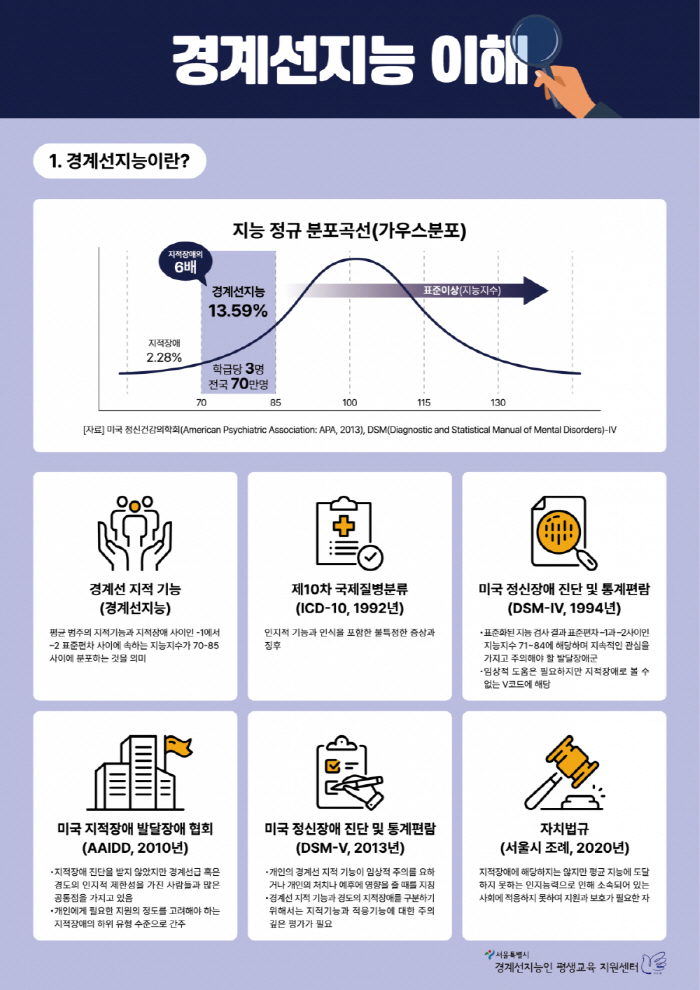If a child who is slow to learn often gets in trouble, his self-esteem decreases...Requires concomitant treatment such as depression and ADHD
Jul 06, 2025
|
The characteristics and difficulties of borderline intelligence children and educational support measures that can be provided by families and society were summarized in a Q&A with Professor Hong Soon-beom of the Department of Pediatric Psychiatry at Seoul National University Hospital.
-What is borderline intelligence?
▶Intelligence refers to the ability to help you learn. Borderline intelligence generally refers to cases where the intelligence index (IQ) is measured as '70-85', which is slightly higher than the diagnostic criteria for intellectual disability (below 70). It is not a stage of evaluation as a disability.
Recently, opinions have emerged worldwide that not only IQ but also more comprehensive evaluation is needed for borderline intelligence diagnosis. In particular, in addition to intellectual functions, 'adaptive functions' necessary for social activities such as communication, sociality, and self-management are considered important as criteria for evaluating borderline intelligence.
-Characteristics of Borderline Intelligence
▶ Children with borderline intelligence have more difficulty learning than their peers, although not as much as children with intellectual disabilities. Literally, it is an ambiguous difficulty of 'the degree of alert', which is why early detection is difficult.
I don't think there is a problem when I first enter the school, but I often start to doubt it from the point when my studies are getting harder. Boundary intelligence may be suspected early due to late language development or lack of understanding even before admission. However, borderline intelligence tends to look clear when compared to normal peers, so it is usually not well found when peers have few opportunities to gather in one place.
-Difficulties of children with borderline intelligence
▶Learning continues not only in school study, but also in everyday life and companionship. Borderline intelligence children often don't understand the rules of play late when playing with their friends or learn how to win games well. As a result, they may be alienated from playing well, and they may have difficulties in companionship.
My relationship with my parents may deteriorate. Parents are very frustrated when they see a child who lacks understanding and is slow to learn, and they usually try to overcome it by scolding them. However, if a child who feels it is difficult to keep up with his peers outside is often scolded even at home, self-esteem decreases and motivation is likely to be lost. It also leads to resentment towards parents.
|
▶The first thing borderline intelligence children need is 'educational help'. This means education that fits the child's learning level. Rather than not being able to keep up with learning while studying with your peers, it is necessary to understand the content and experience development through study that fits the level. Even if learning progress is lagging, it is emotionally more desirable than just spending time overwhelmed by studying that you don't understand at all.
In addition, training to improve adaptability is also important. Adaptation functions include communication, sociality, self-management, and life and exercise skills. Even if a child's intelligence is low, adaptation skills can be developed through education and training. In adolescence, career counseling and vocational training are important ways to improve adaptation function.
Finally, treatment for comorbidities such as depression, anxiety, and ADHD is also needed. Borderline children are more likely to suffer from these conditions than their peers. If appropriate treatment is provided to a child in need of treatment for this disease, the effect of educational help can also increase.
-Home help for borderline intelligence children
▶It is important to wait patiently for the child at home. It is also good to practice education on academic and daily life in advance at home according to the child's learning level. For example, for borderline intelligence children who have difficulty understanding the rules of play than their peers, it is helpful for parents to play with their children first. Even if a child seems slower than others, it is necessary to help him experience developing according to his or her own progress. At this time, pay attention to both excessive expectations and neglect, and generously praise and congratulations should be given when achievements are achieved, even if they are later than their peers.
Professor Hong Soon-beom of the Department of Pediatric Psychiatry at Seoul National University Hospital said "It is difficult to imagine a person weighing 100 kg competing with a person weighing 50 kg in boxing or wrestling. Likewise, it is not fair for a person with an IQ of 140 and a person with an IQ of 70 to compete academically. However, intelligence is not easily revealed on the outside like weight, so it is easy to mistake this competition as fair. For the healthy growth of relatively low-intelligence children, a society that does not struggle with academic competition is needed.
Then "At the same time, it should be possible to socially relieve the burden on parents." There will be a need for a social atmosphere in which parents who raised children who are not smart as happy adults, not parents who sent their smart children to prestigious universities, are in the spotlight," he added.
|
This article was translated by Naver AI translator.
















